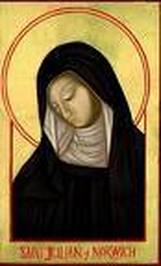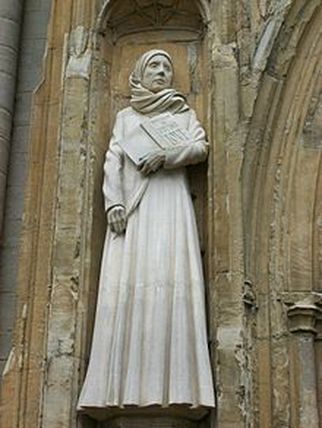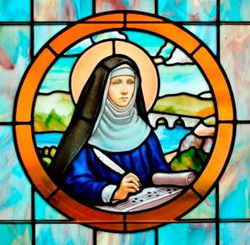
“All shall be well, and all shall be well and all manner of things shall be well.”
― Julian of Norwich
Last night, I attended the second in a Series of studies about Mystics. Hosted by Maureen Mahoney at The Room Above in Brookside, we learned about Julian of Norwich, who lived from roughly c-1342-1416.
She is considered an English anchoress who is regarded as one of the most important Christian mystics. An 'Anchoress' denotes someone who, for religious reasons, withdraws from secular society so as to be able to lead an intensely prayer-oriented, ascetic and often-times Eucharist-focused life. The anchoritic life is one of the earliest forms of Christian monastic living. Her real name may never be known since she took on the name of the town where her live-in church was located.
At about age 30, she because severely ill, and was thought to be dying. During this illness, she had a series of intense visions about Jesus Christ. She recovered the following year, and wrote about her visions immediately, which was called Revelations of Divine Love. (which is now know as the 'short text' with only 25 chapters). About 20-30 years later, in the early 1390's, she began to write a theological exploration of her visions, which contains 86 chapters (now known as the 'long text').
Julian became well known throughout England as a spiritual authority: Julian of Norwich lived in a time of turmoil, but her theology was optimistic and spoke of God's love in terms of joy and compassion, as opposed to law and duty. Although Julian's views were not typical, the authorities did not challenge her theology because of her status as an anchoress.
― Julian of Norwich
Last night, I attended the second in a Series of studies about Mystics. Hosted by Maureen Mahoney at The Room Above in Brookside, we learned about Julian of Norwich, who lived from roughly c-1342-1416.
She is considered an English anchoress who is regarded as one of the most important Christian mystics. An 'Anchoress' denotes someone who, for religious reasons, withdraws from secular society so as to be able to lead an intensely prayer-oriented, ascetic and often-times Eucharist-focused life. The anchoritic life is one of the earliest forms of Christian monastic living. Her real name may never be known since she took on the name of the town where her live-in church was located.
At about age 30, she because severely ill, and was thought to be dying. During this illness, she had a series of intense visions about Jesus Christ. She recovered the following year, and wrote about her visions immediately, which was called Revelations of Divine Love. (which is now know as the 'short text' with only 25 chapters). About 20-30 years later, in the early 1390's, she began to write a theological exploration of her visions, which contains 86 chapters (now known as the 'long text').
Julian became well known throughout England as a spiritual authority: Julian of Norwich lived in a time of turmoil, but her theology was optimistic and spoke of God's love in terms of joy and compassion, as opposed to law and duty. Although Julian's views were not typical, the authorities did not challenge her theology because of her status as an anchoress.
 A statue of Julian on the front of Norwich Cathedral. (wikipedia)
A statue of Julian on the front of Norwich Cathedral. (wikipedia) At about age 30, she because severely ill, and was thought to be dying. During this illness, she had a series of intense visions about Jesus Christ. She recovered the following year, and wrote about her visions immediately, which was called Revelations of Divine Love. (which is now know as the 'short text' with only 25 chapters). About 20-30 years later, in the early 1390's, she began to write a theological exploration of her visions, which contains 86 chapters (now known as the 'long text').
Julian became well known throughout England as a spiritual authority: Julian of Norwich lived in a time of turmoil, but her theology was optimistic and spoke of God's love in terms of joy and compassion, as opposed to law and duty. Although Julian's views were not typical, the authorities did not challenge her theology because of her status as an anchoress.
Julian's belief in God as mother was controversial. Some scholars think this is a metaphor, rather than a literal belief or dogma. In her fourteenth revelation, Julian writes of the Trinity in domestic terms, comparing Jesus to a mother who is wise, loving and merciful. Julian's revelation revealed that God is our mother as much as He is our father. F. Beer asserted that Julian believed that the maternal aspect of Christ was literal and not metaphoric: Christ is not like a mother, He is literally the mother. Julian believed that the mother's role was the truest of all jobs on earth. She emphasized this by explaining how the bond between mother and child is the only earthly relationship that comes close to the relationship one can have with Jesus. She also connected God with motherhood in terms of "the foundation of our nature's creation, "the taking of our nature, where the motherhood of grace begins" and "the motherhood at work". She wrote metaphorically of Jesus in connection with conception, nursing, labor and upbringing, but saw him as our brother as well.
The saying, "…All shall be well, and all shall be well, and all manner of thing shall be well", which Julian claimed to be said to her by God Himself, reflects her theology. It is one of the most famous lines in Catholic theological writing and is one of the best-known phrases of the literature of her era.
(sources: www.julianofnorwich.org, wikipedia, www.middle-ages.org.uk/julian-of-norwich.htm)
Julian became well known throughout England as a spiritual authority: Julian of Norwich lived in a time of turmoil, but her theology was optimistic and spoke of God's love in terms of joy and compassion, as opposed to law and duty. Although Julian's views were not typical, the authorities did not challenge her theology because of her status as an anchoress.
Julian's belief in God as mother was controversial. Some scholars think this is a metaphor, rather than a literal belief or dogma. In her fourteenth revelation, Julian writes of the Trinity in domestic terms, comparing Jesus to a mother who is wise, loving and merciful. Julian's revelation revealed that God is our mother as much as He is our father. F. Beer asserted that Julian believed that the maternal aspect of Christ was literal and not metaphoric: Christ is not like a mother, He is literally the mother. Julian believed that the mother's role was the truest of all jobs on earth. She emphasized this by explaining how the bond between mother and child is the only earthly relationship that comes close to the relationship one can have with Jesus. She also connected God with motherhood in terms of "the foundation of our nature's creation, "the taking of our nature, where the motherhood of grace begins" and "the motherhood at work". She wrote metaphorically of Jesus in connection with conception, nursing, labor and upbringing, but saw him as our brother as well.
The saying, "…All shall be well, and all shall be well, and all manner of thing shall be well", which Julian claimed to be said to her by God Himself, reflects her theology. It is one of the most famous lines in Catholic theological writing and is one of the best-known phrases of the literature of her era.
(sources: www.julianofnorwich.org, wikipedia, www.middle-ages.org.uk/julian-of-norwich.htm)

 RSS Feed
RSS Feed
